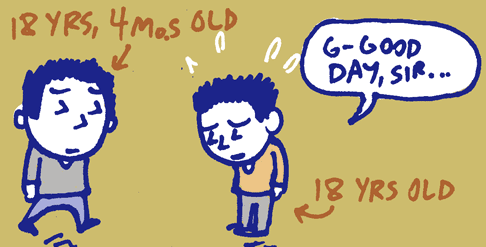
Prior to coming to Tokushima to study calligraphy earlier this year, I had lived in Japan on four separate occasions. With more than three years of experience under my belt, I figured my grasp of Japanese culture was pretty solid, and didn’t expect any real surprises this time around. Having been here for just four months now, I’ve already seen this assumption get proven wrong twice (and counting).
It was pure arrogance to assume that my knowledge of Japanese culture was somehow comprehensive (or even could be), but especially considering the narrow scope of my previous experience. I was unable to communicate beyond caveman grunts for most of it, and my contact with Japanese people my own age was all but nonexistent. Working as an assistant English teacher, most of the people I met were either students or teachers, so everyone was either ten years old, or in their fifties.
This time around I’m in a university setting, so I’m surrounded by people my own age (actually most of them are five or ten years younger than me, but as I’m a cartoonist & blogger, it’s probably safe to assume we’re at about the same maturity level). And my Japanese is just starting to approach the level where I can actually make friends with people who don’t know any English. So I’m getting a glimpse of Japan I didn’t have access to before, leading to the two before-mentioned instances of mini-culture shock.
The first one being…
The Militaristic Seniority System
Long before experiencing the real thing, my introduction to Japanese university life came in the form of anime & manga. The neon-haired, saucer-eyed character designs did little to assure me that these stories were in any way accurate portrayals of Japanese college life, and I took everything in them with a grain of salt.
So whenever a character would refer to an upperclassman as “Yamada-san” or whatever, I always assumed that this, like the character designs, was an exaggeration; a blunt attempt to paint the speaker as shy and overly polite. Never did I actually imagine that people in their teens and twenties would unironically refer to each other as “Mr./Mrs. So-and-so”, especially in this day and age.
Upon arriving at Shikoku University, however, I learned my assumption was wrong. Underclassmen duly refer to upperclassmen in polite forms that I would hesitate to use in the States unless I was meeting the president or something. I’m starting to get used to it now, but it’s still sort of weird to see a freshmen refer to a sophomore as Mr. Lastname, or hearing Mr. Lastname giving the freshmen a dressing down for some infraction. I mean, I could understand it if Mr. Lastname was middle-aged or something, but the age/life experience difference between a freshman and a sophomore is just a matter of a few months. Seeing that level of deference among peers is like watching a fraternity hazing ritual or something.
The big question for me was where I fit in the food chain. I’m older than most of the students, but have much less experience in calligraphy. A classmate helpfully summed it up by saying “Age trumps all”. So most of my fellow students (even friends) call me “Lars-san”, and I can call them by just their name, or by attaching a friendly suffix to their name like “chan” or “kun”. Which situations I can/should use those opens up a whole other can of worms altogether. I’m still trying to figure that one out…
The other cultural thing that surprised me, involving attitudes towards dating, will the subject of next weeks entry.
